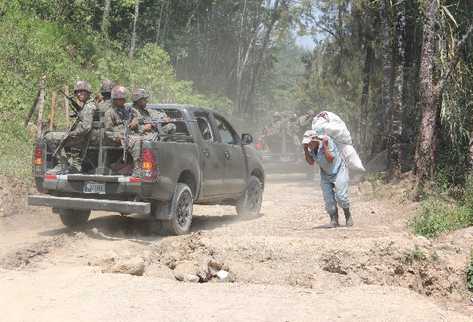Indigenous Uprising and Repressive Powers in Huehuetenango
Indigenous Uprising and Repressive Powers in Huehuetenango

What are the local powers in Huehuetenango, Guatemala, afraid of? What interests are they looking after and what are their connections with the central government? Those are a couple of questions that we are asking ourselves as we try and understand what has recently taken place in Huehuetenango.
We don't understand why they have twice imprisoned Rigoberto Júarez Mateo and Domingo Pascual. What is at play? It must be something that matters at a local and national level in order for justice to be operating in such an arbitrary fashion, as it did yesterday on March 27, 2015, when both men were again arrested as they were about to leave prison for house arrest and they were met instead with a new arrest warrant for "plagiarism, kidnapping and intent to commit a crime."
I propose that we consider this development in a way that connects a series of five events in Huehuetenango, in a way that allows us to weave an explanation:
1. Over the past years, Santa Eulalia, Santa Cruz Barrilas, San Mateo Ixtatán and Huehuetenango more generally have been converted into territories at the epicentre of Indigenous politics, which is to say where communities are engaged in a struggle for territorial sovereignty and communal governance structures. We know that Rigoberto and thousands of other women and men have opposed 19 mining projects and 21 hydroelectric projects proposed in Huehuetenango.
2. There have been numerous people killed and incarcerated over the past years, we were outraged to learn of the disappearance and death of Daniel Pedro on April 7, 2013; of the imprisonment of Rubén Herrera; of the harassment against women in Barillas and of the militarization of the highways.
3. On February 26 of this year, Francisco Juan, Arturo Pablo Juan and Adalberto Villatoro Hernández were detained in court in Huehuetenango when they went on their own volition to one of the trials related to the accusation that they committed crimes of "plagiarism, kidnapping, threats, intent to commit a crime and illicit meetings and demonstrations." Of course we know that what the powerful want is to weaken the communal struggle against the hydroelectric plant in Barillas.
4. On January 20, 2015, the community radio station Snuq' Jolom Konob' was ordered closed by the municipality. The station has been an open platform from which multiple voices that denounce the mechanisms of violence and displacement that have been put into place to clear territories where a Spanish company wishes to build a dam. The radio station has also openly called out corruption of local power groups. Of particular importance, the radio was a hub for intra-community articulation, where communities can listen to information about the struggles of other communities.
5. On March 19 of this year, when community authorities attempted to re-open Snuq' Jolom Qonob' radio in a massive communal act, there was a violent altercation and two journalists were attacked, including Lucia IxchÃu.
This chain of aggressions -- of which there are many more-- permits us to see how in the region of Huehuetenango communal struggles are interpollating and fracturing municipal powers, and regardless of adverse conditions, have managed to stop the displacement of people from the material basis from which they live. That is why these men and women are systemically attacked, because they are defending their land. Remember that it was communities in Huehuetenango that began the struggles against extractive projects, for the same reason they have been attacked, jailed and murdered over the past years.
What is happening in Huehuetenango is an Indigenous uprising that seeks to put the brakes on the death that will come with the hydroelectric projects and the mines, an uprising that has re-created forms of communal politics of listening and deliberation.
If justice in Guatemala wants to cultivate the space that was opened when dictator Rios Montt was taken to trial, Juárez Mateo and Pascual must be freed, and these projects of destruction and death in the form of dams must be stopped.
Gladys Tzul Tzul is a Doctoral candidate in Sociology at the Benemérita Universidad Autónoma de Puebla, Mexico, and a member of the permanent seminar on Communally Woven Webs and Forms of the Political. Translated by Dawn Paley.

